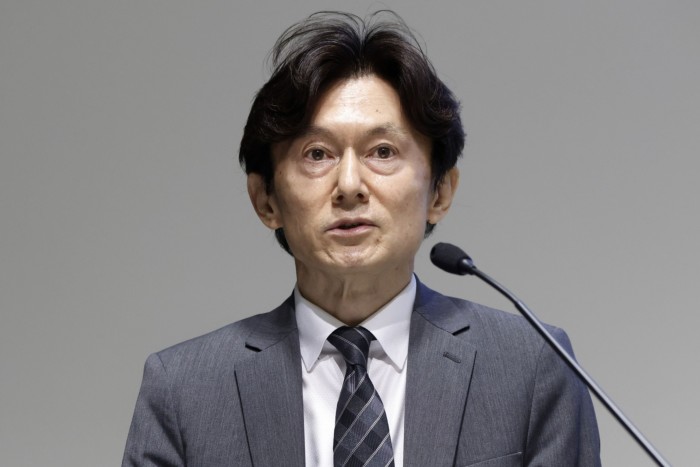A day after the owner of Uniqlo clothing brand stunned the nation with a plan to raise wages in Japan by up to 40 per cent, its chief financial officer told investors the pay hike was not a one off.
“We want workers to work hard under this new system and if sales and profits rise, there will be room to raise our remuneration to a much higher level,” Fast Retailing’s finance chief Takeshi Okazaki said this month.
In a country where companies have resisted raising pay and the workforce has refrained from aggressive salary demands for most of the past three decades, Fast Retailing’s move is a watershed for the government and the Bank of Japan’s battle to lift the economy out of deflation.
If other companies follow suit and the wage hikes continue, analysts say the ramifications could be far-reaching. The creation of a virtuous cycle of rising wages, consumption and prices would allow Japan to finally move away from the negative interest rates and ultra-loose monetary policies that have defined its struggle with low inflation and low growth.
Haruhiko Kuroda, the BoJ’s longest-serving governor who will step down in April, last week defied market pressure and kept the key pillars of his monetary easing programme unchanged, stressing that wage growth was not sufficient despite the global inflation shock.
“Many of the current working population are very sceptical about prices and wages rising since they have never experienced it,” said Hiroyuki Ueno, chief strategist at Sumitomo Mitsui Trust Asset Management. “Even if you look back at the past 20 years, we’ve never seen this much pressure for company management to raise wages to address a rise in prices. This could be the turning point.”

So far, the signs are encouraging. Before Fast Retailing’s announcement, Canon, the camera and printer maker, revealed it would raise the monthly pay of its 26,000 employees by an average 3.8 per cent.
Suntory Holdings, the drinks group behind Jim Beam and Yamazaki, aims to raise wages in Japan by 6 per cent. Eye drops-maker Rohto will revise the seniority-based component of its pay structure for the first time in 22 years, resulting in an average 7 per cent hike for employees in 2022.
The moves follow calls from Prime Minister Fumio Kishida for companies to raise wages. Such government-led efforts are not new: the late former prime minister Shinzo Abe spent eight years trying to convince them they could not continue offering some of the lowest average increases in the OECD.

But while Abenomics led to a short-term rise in wages, Kishida’s “new capitalism” programme aims to result in more organic growth in salaries that would allow the BoJ to sustainably meet its 2 per cent inflation target.
Japan’s core inflation, which does not include volatile fresh food prices, hit 4 per cent in December, its fastest pace in 41 years.
In a sign of changing times, the Japanese Trade Union Confederation is seeking a 3 per cent year-on-year increase in base pay in the shunto spring wage negotiations, its highest demand since 1995. On Tuesday, Keidanren, Japan’s largest business lobby, called on companies to proactively raise pay as “corporate social responsibility”.
Goldman Sachs expects a raise in overall annual wages of about 2.5 per cent from the spring negotiations — but that would fall short of the overall 3 per cent wage growth the BoJ has said is needed for its inflation target.
And the shunto negotiations involve only the largest corporations. Company executives warn that the hurdles to salary increases are especially high for the small and medium sized enterprises that employ at least 70 per cent of Japanese workers.
While companies such as Fast Retailing have managed to increase their prices to reflect the rising cost of materials, smaller businesses have struggled to sufficiently pass on higher costs.

“We can’t possibly think about raising our base pay. Our priority is to maintain our business,” said Kimihiko Yamashita, who runs industrial parts maker Araie Manufacturing in Ishikawa prefecture. Araie recently managed to convince customers to accept a 3 per cent price rise, but this would only cover its losses from surging energy and materials costs, Yamashita said.
Adjusted for consumer inflation, Japanese real wages were actually down 3.8 per cent year-on-year in November.
A structural issue hindering higher salaries is the lack of workforce mobility because of the country’s longstanding system of lifetime employment.
“Unless there is more liquidity in Japan’s job market, the wage increases will be one-off and unsustainable,” said Ken Shibusawa, chair of Commons Asset Management and a core member of a panel drafting Kishida’s economic policy.
Japanese labour laws make it difficult for companies to lay off full-time employees. In return for workers being given jobs for life, unions often have a collaborative relationship with company management, making it difficult for them to issue tough salary demands. That makes it less likely for Japan to develop the kind of inflationary wage spiral currently being fuelled by widespread strikes in the UK.
Government officials have now realised that tax breaks already introduced for companies that hike wages are not enough, with Kishida also promising investment in retraining Japanese workers to help them shift to new industries that are expanding.
“We are not sure whether Japan will become as liquid as the US market, but Japan will gradually become more liquid in the mid to long term through globalisation, changes in industry structures, and shrinking workforce population,” said Soichiro Minami, chief executive of Visional, which operates an online job site.
Many Japanese companies operating globally are already shifting away from seniority-based pay in order to recruit international talent, and hiring competition in a tight labour market should also bolster salary levels.
“If we’re going to ask employees in Japan to do global quality work, then we need to bring Japanese remuneration to international standards,” Fast Retailing’s Okazaki said. “Even with this latest revision to our pay system, it’s not yet at a global level.”
Additional reporting by Leo Lewis in Tokyo






